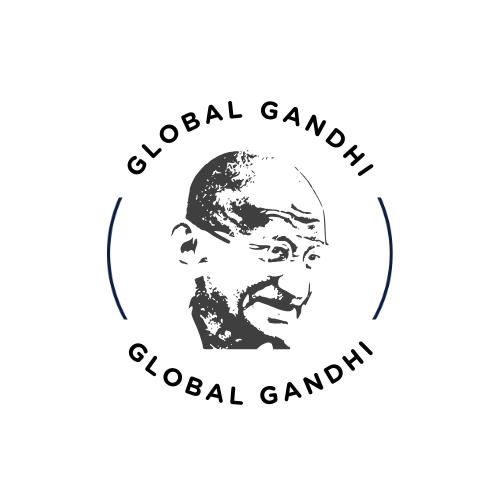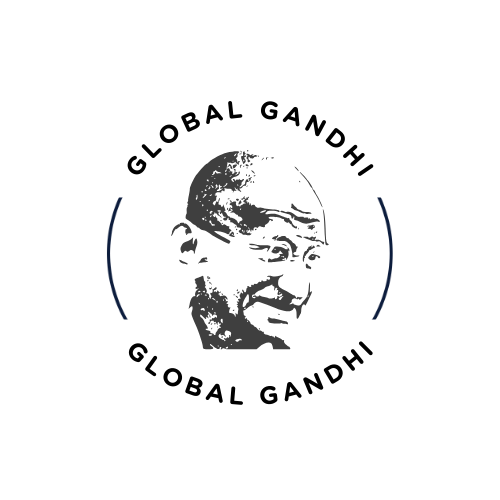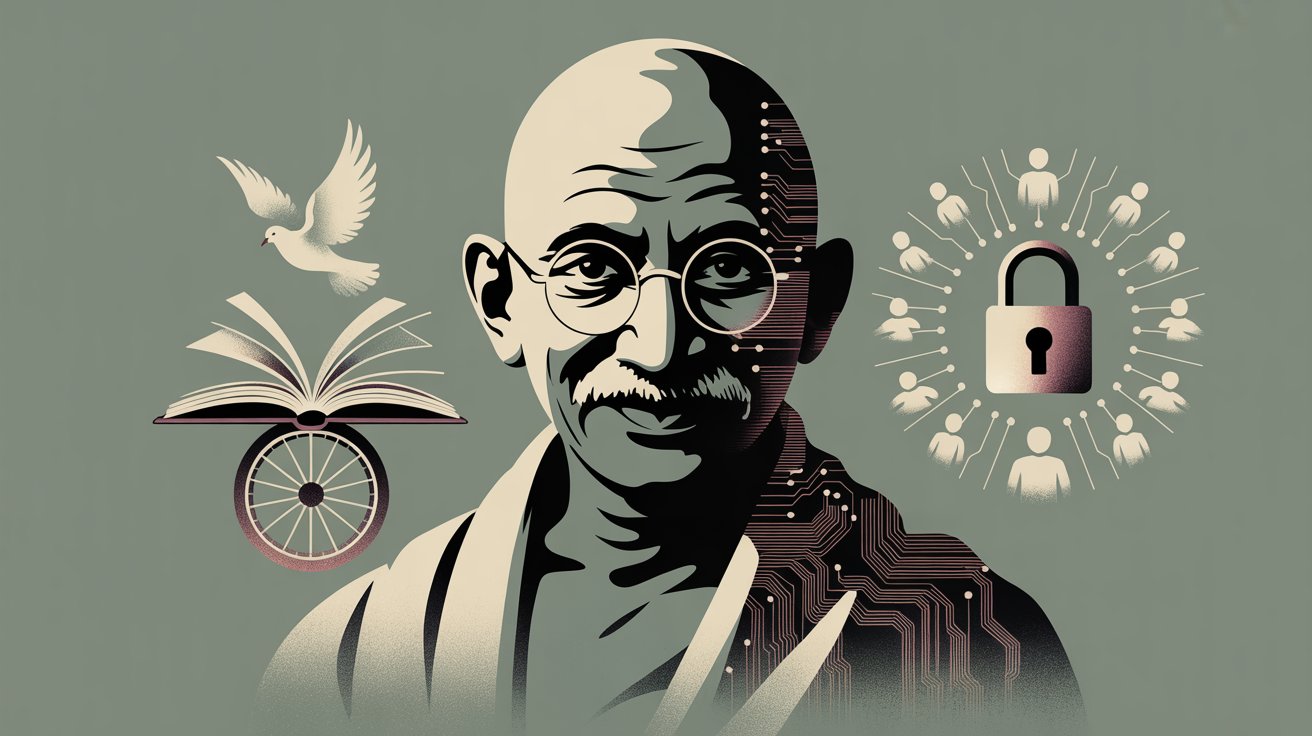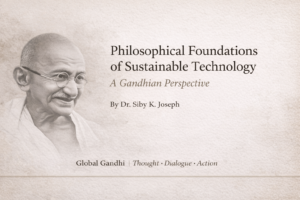Mahatma Gandhi never touched a smartphone or sent an email, yet his moral vision feels patently relevant to our digital world. The internet today is a space where truth and lies travel at the same speed, where voices can uplift or wound, and where convenience often overshadows responsibility. Gandhi’s principles i.e. truth (Satya), non-violence (ahimsa), simplicity, self-rule (swaraj), and responsibility offer a way to think about how we should live ethically in this digital age.
Truth in a Time of Misinformation
Scroll through any social media feed and you will find misinformation disguised as fact. Gandhi called truth the highest form of worship. He believed truth was not optional but the foundation of both personal character and public life. If we applied its digitally, this would mean refusing to forward unverified news, demanding transparency from tech platforms, and valuing accuracy over viral speed. A Gandhian ethic of truth would challenge the attention economy itself, which profits from outrage more than from honesty.
Non-Violence Beyond the Physical
Digital violence often looks different from what Gandhi faced, but it is no less destructive. Cyberbullying, Digital trolling, and Hate speech corrode trust and dignity. For Gandhi, ahimsa was more than avoiding physical harm it was an active commitment to compassion and respect. Translating that into digital behaviour means choosing dialogue over insults, empathy over mockery, and demanding safer digital environments where people are not dehumanized for clicks.
Simplicity in a World of Excess
Gandhi warned against unchecked consumerism. The digital version of this is endless scrolling, binge-watching, and app designs engineered to keep us bowed. Simplicity here does not mean rejecting technology but using it consciously. Gandhi would ask: are we mastering technology, or is it mastering us? In that sense, practicing restraint could mean limiting screen time, focusing on meaningful interactions, and remembering that life is more than algorithms.
Swaraj as Digital Autonomy
For Gandhi, swaraj i.e. self-rule was not just political independence but personal self-mastery. In today’s digital world, our autonomy is under pressure from constant surveillance, algorithmic nudging, and data extraction. A Gandhian take on digital swaraj would insist on control over our data, freedom from manipulative design, and platforms that serve people rather than exploit them. Just as Gandhi resisted colonial domination, he would encourage resisting digital domination by corporations and states.
Responsibility for the Digital Commons
Gandhi believed individual choices shape collective destiny. In online space, this means recognizing that our posts, likes, and shares affect the wider public sphere. Responsibility in the digital commons involves promoting respectful debate, refusing to fuel polarization, and holding tech companies accountable for the ecosystems they build. Ethical behaviour online is not just about personal morality it is about protecting the health of democracy and community.
Why Gandhi Still Matters
It may seem strange to invoke Gandhi in conversations about artificial intelligence, social media, or digital privacy. After all, he lived in an era of telegrams and spinning wheels, not smartphones and satellites. Yet that is precisely why he matters. Gandhi did not chase the newest tools of his time; he asked deeper questions about how tools shaped human beings, communities, and moral life. His lens wasn’t technological but ethical, and that is the perspective we urgently need in the twenty-first century.
Take the challenge of misinformation. Fact-checking software and artificial intelligence can help, but they cannot substitute for a culture of truth. Gandhi reminds us that truth is not just about accuracy of information, but about integrity of intent. Even in the most advanced digital system, if people are motivated by profit, manipulation, or hatred, technology will amplify those motives. Gandhi’s insistence on truth as a lived value cuts to the root of this problem.
Let consider the debates around artificial intelligence and automation. Much of the conversation today revolves around efficiency, productivity, and innovation. Gandhi would ask instead: does this technology preserve human dignity? Does it reduce exploitation, or deepen it? His philosophy demands that technology serve people, especially the most vulnerable, rather than turning them into disposable parts of a machine-driven economy.
Then there is the question of digital addiction. Gandhi spoke often about self-restraint, not as denial but as freedom from dependence. In his time, he practiced restraint in food, clothing, and possessions. In ours, the same principle applies to screen time, online consumption, and constant connectivity. Gandhi’s ethic of simplicity offers a counterweight to the culture of endless scrolling and algorithm-driven engagement.
Finally, Gandhi matters because he believed in starting small. He never imagined that ethical transformation would come from top-down structures alone. Instead, he placed faith in individuals making conscious, moral choices. In the digital age, this means each user deciding to pause before sharing unverified news, each developer designing with human well-being in mind, and each citizen demanding accountability from digital corporations. These actions may appear minor, but as Gandhi showed through satyagraha, small acts of moral courage can shift entire systems.
In short, Gandhi matters through its ethical principles today not because he had answers to specific technological dilemmas, but because he gives us the moral vocabulary to ask the right questions. His voice is a reminder that behind every algorithm is a human decision, and behind every digital future is a choice about what kind of world we want to build.
Conclusion
The digital world reflects both the best and worst of human behaviour. Gandhi’s philosophy doesn’t give us technical fixes but offers a moral compass. He reminds us that technology should never be an end in itself. Its purpose must be to serve human dignity, truth, and community. In an age where algorithms drive behaviour and information overwhelms wisdom, Gandhi’s call for truth, non-violence, simplicity, and responsibility is more than relevant it is essential.
About the Author
Pranjal Saraswat is a resolute and enthusiastic individual with a deep interest in Political Science and International Relations. His academic journey has not only sharpened his skills but also equipped him with the ability to understand complex issues and explore their solutions. Pranjal earned his Master’s degree in Political Science from the prestigious Department of Gandhian Thought and Peace Studies at the Central University of Gujarat. He is currently pursuing a PhD in the same field, with his research focusing on cyber warfare capabilities and peace. This subject offers an important perspective on the challenges of the digital age and their harmony with Gandhian philosophy.








